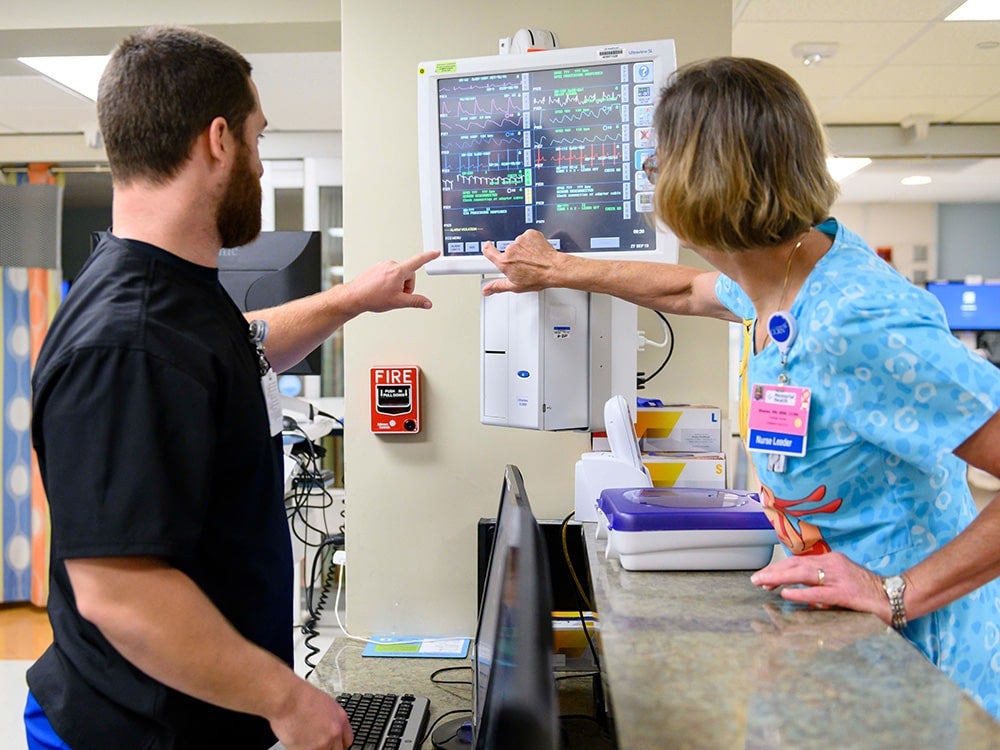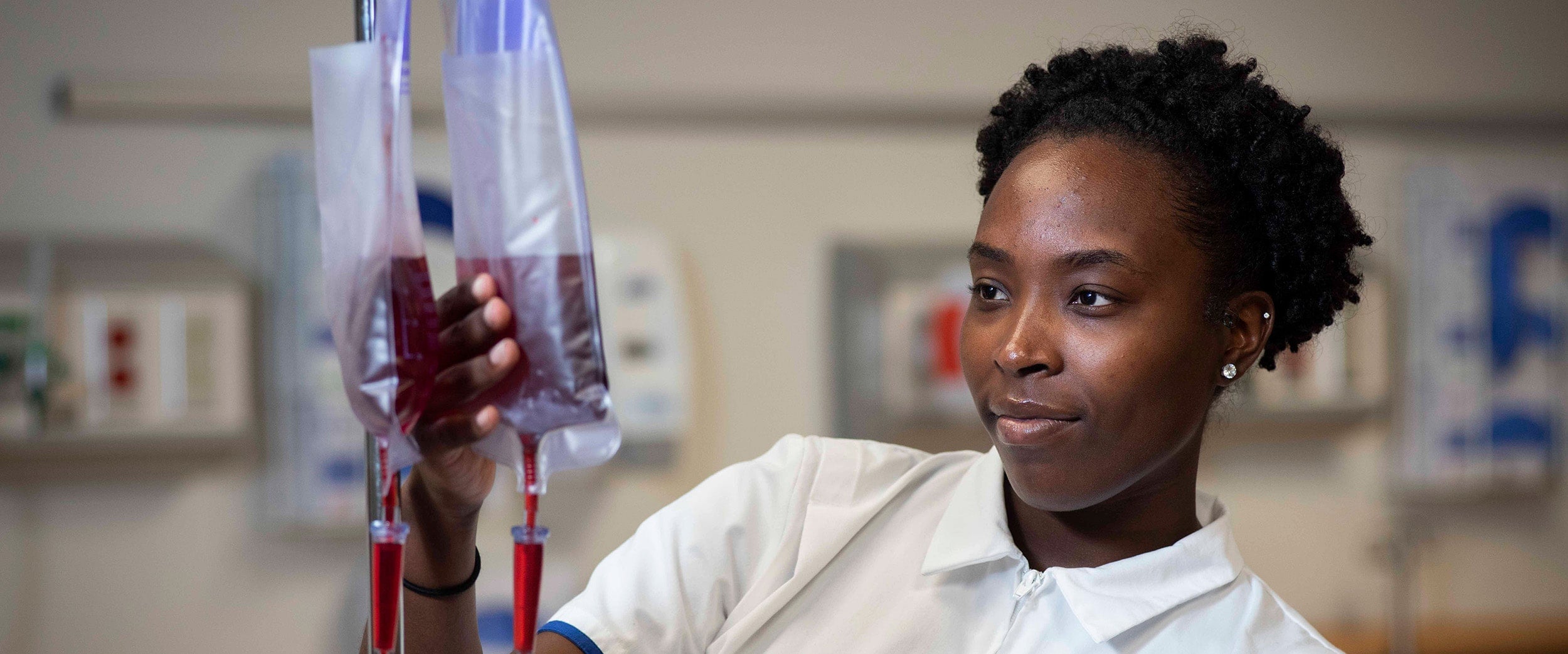It’s time to lead. Build on your professional experience with advanced, clinically focused training to create health care systems that improve patient outcomes.
Locations
- Online
Why Earn a DNP at Georgia Southern?
- 100% online coursework provides flexibility for working professionals.
- Gain the edge for roles in health care management and policy.
- Includes 630 applied clinical hours for hands-on learning.
- Scholarships available for an even more affordable degree.
- 77 credit hours to completion.
Ascend to the highest distinction of the nursing profession with a Post-MSN Doctor of Nursing Practice (DNP) from Georgia Southern University. This versatile degree angles advanced practice nurses for leadership in public and private organizations, where they’ll assess health needs, develop and implement new practices, optimize outcomes and propose policies to improve patient care.
Offered over six semesters, coursework is 100% online, with most of the content being asynchronous — giving you the flexibility to complete your work alongside your professional duties. You’ll apply what you’re learning and begin to make an impact at a systemic level through intensive clinical experiences, including a major project undertaken with an experienced faculty mentor.
A choice of electives in areas like public health, informatics and business helps you unlock additional career opportunities and puts your knowledge in new contexts. Upon fulfilling all requirements, you’ll be prepared to offer the latest, evidence-based care and lead organizations forward with confidence.
Ready to Apply?
What Can You Do With a DNP?
Demand for nurses is acute, particularly for those with advanced preparation. Earning your DNP not only helps you assume these roles but also deliver specialized nursing care in multiple settings. Or, you’re additionally qualified to enhance care delivery from a position of leadership, where you’ll guide practices or health organizations through evidence-based evaluations, decisions and programs.
Where our graduates work:
- Hospitals and clinics
- Private practices
- Health care consulting
- Government agencies
What our graduates do:
- Certified nurse-midwife
- Certified registered nurse anesthetist
- Chief nursing officer
- Clinical nurse specialist
- Health care manager
- Nurse practitioner
What You’ll Learn
Through courses in health policy, outcomes management, ethics and leadership, you’ll begin to understand how to engage with health care systems and their processes and operations. This focus not only grows your clinical foundation but equips you to shape the organizations, cultures and procedures that inform individual and population-level patient care. You’ll also grow as a researcher, gaining the tools to create and assess programmatic interventions and report on your findings in scholarly settings.
The DNP program includes a substantial clinical component: You’ll commit to improving health service delivery and outcomes through a collaborative initiative focused on a target population, as well as an advanced clinical project.
See the CurriculumClinical Project
Identify and analyze a health care issue at a more nuanced level. You’ll combine your experience and expertise to elevate patient outcomes and share your results through a professional journal or conference.

Want to Learn More?
Explore essential information about our Post-MSN Doctor of Nursing Practice program, including application details, accreditation status, and licensing disclosures. Gain insight into the program’s credibility and requirements to help you start your journey toward success with the knowledge you need.
The Post-MSN Doctor of Nursing Practice (DNP) program is designed to build upon the foundation of the Advanced Practice Registered Nurse (APRN) role. The DNP program is directed toward advanced practice registered nurses and closely associated specialty areas (i.e. NP, CNS, CRNA, CNM preparation) and other specialty areas reviewed on an individualized basis. All applicants’ prior coursework will be reviewed, and individual DNP programs of study will be developed.
Admission is open to those who have:
- A Master of Science in Nursing (MSN) degree from an accredited institution with an advanced practice nursing focus.
- A minimum GPA of 3.0 (on a 4.0 scale) for previous graduate coursework.
- Completed a course in introductory statistics with a grade of C or better.
To apply, please submit:
- An online application. (There is a $50 non-refundable application fee.)
- Georgia Southern University Health Services Form (must be completed before your first semester and completed each semester afterward).
- Three letters of recommendation. Forms in the online application are acceptable, or you can attach three recommendation letters to the application.
- Proof of American Heart Association Level C (2 person-BLS) or Red Cross CPR certification.
- Proof of Georgia RN licensure. (Write COPY over any replication of a license submitted.)
Submit all materials online with your application through the College of Graduate Studies Admissions office.
International Students
All international applicants, including resident and non-resident aliens, whose native language is not English and who do not have an undergraduate degree from a regionally accredited U.S. college or university, are required to submit official TOEFL scores taken within the year immediately preceding the requested semester of admission.
You will need a minimum total score of 83 and minimum scores of 20 for each of the skills evaluated by the TOEFL: Listening, Reading, Speaking and Writing. An original copy of the test score, sent by the testing agency to the Office of Graduate Admissions, is required before any action is taken on an application. Subsequently forwarding a copy of the score provided to you is not acceptable.
Application Deadlines
Your application and all required documents must be received by March 1 for admission consideration for the Summer cohort.
Contact Information
Chelsea Doyle
Graduate Program Administrative Assistant
Office: Armstrong Campus-Ashmore Hall 266
912-344-2973chelseadoyle@georgiasouthern.edu
Apply NowAt Georgia Southern, enjoy the flexibility of fully online courses that fit within your busy schedule, allowing you to advance in your career while you continue to work and earn. Online instructors weave interactive experiences into your courses, ensuring you engage at a deeper level.
Plus, you’ll have access to an academic and technical support team, so you’re never on your own.
The Post-MSN DNP program uses both synchronous (live, real-time) and asynchronous (on your own, not live) formats. Most of the coursework is asynchronous, but live sessions are scheduled for selected online courses. Students should consult with individual course syllabi for specific live session requirements.
About Our Online ProgramsBuild on your Bachelor of Science in Nursing degree to qualify for advanced nursing roles, pursuing one of four nurse practitioner tracks, including Adult-Gerontology Acute Care, Adult-Gerontology Primary Care, Family Nurse or Psychiatric Mental Health. The program includes an option to finish with an MSN.
The DNP program at Georgia Southern University is accredited by the Commission on Collegiate Nursing Education.
As recipients of the highest nursing degree, students who complete the School of Nursing DNP degree program will be able to:
SLO 1: Synthesize core knowledge from the liberal arts, sciences, and nursing as the foundation for advanced level professional practice.
SLO 2: Integrate knowledge of organizational systems, leadership principles, and resources to become responsible, safe, and accountable advanced level professional nurses that demonstrate professional standards of moral, ethical, and legal conduct.
SLO 3: Generate advanced level clinical judgment/decision making by integrating healthcare information, technology, scholarship, inquiry, and current evidence to improve individual and population healthcare outcomes.
SLO 4: Develop inter-professional communication strategies that enhance collaborative partnerships and improve patient health outcomes.
Note: The Georgia Southern University DNP Program Outcomes are based on the AACN Essentials
The School of Nursing anticipates that graduates of this program will seek the following professional state licenses or certifications: certification as an APRN (Family Nurse Practitioner, Psychiatric Mental Health Nurse Practitioner, Adult-Gerontology Acute Care Nurse Practitioner or Adult-Gerontology Primary Care Nurse Practitioner [depending on which program they completed]) and licensure as an APRN.
The School of Nursing has determined that the required classes and educational activities of this online academic program will qualify a graduate to take the exam for certification as an APRN in Georgia and other states as listed on the National Council of State Boards of Nursing. The school has not determined whether this program satisfies the requirements of all states and territories for APRN certification and licensure. Visit the National Council of State Boards of Nursing to determine the requirements of your state or territory.
Many of the clinical programs offered by the Waters College of Health Professions require a clinical internship or practicum experience to fulfill degree requirements. Pursuant to the University’s legal agreements, participants in clinical experiences are required to abide by the workplace rules of the clinical site. The University is aware of recent federal requirements that would mandate vaccination against COVID-19 for those working in certain settings, including health care. At this time, we expect that these new requirements may significantly impact our ability to locate a placement for students who remain unvaccinated. As always, WCHP will continue to make every effort to place students at clinical sites. However, please be aware that we may be unable to locate a site to accept unvaccinated students, which may cause a delay or inability to progress and complete the program of study.
| Summer Semester 1 5 Credit Hours | Fall Semester 1 5 Credit Hours | Spring Semester 1 9 Credit Hours |
|---|---|---|
| NURS 9111 Biomedical Ethics (2) | NURS 9113 Biometrics (3) | NURS 7130 Health Policy Concerns in Delivery Systems (3) |
| NURS 9112 Role Transition for DNP-Prepared APRNs (2) | NURS 9114 Outcomes Management (2) | NURS 7130 Health Policy Concerns in Delivery Systems (3) |
| NURS 9115 Scholarly Writing at the Doctoral Level (1) | Elective 1 (3) |
| Summer Semester 2 6 Credit Hours | Fall Semester 2 6 Credit Hours | Spring Semester 2 6 Credit Hours |
|---|---|---|
| NURS 9931 Clinical Project 1 (180 applied clinical hours) (3) | NURS 9144 Leadership and Management in Practice Transformation (3) | NURS 9933 Clinical Project 3 (180 applied clinical hours) (3) |
| Elective 2 (3) | NURS 9932 Clinical Project 2 (180 applied clinical hours) (3) | Elective 3 (3) |
| Course Prefix | Course Number | Course Title | Short Description |
|---|---|---|---|
| EDUF | 7130 | Learning Theories and Applications | Examines the principles and theories of learning that serve as the basis for educational models and practices. |
| EDUF | 8131 | Theories of Adolescence | The rapidly changing world of today’s adolescents and the ever-changing nature of the field of adolescence will be examined from three perspectives: theory, research and contemporary social forces. |
| EDUF | 8133 | Interaction and Learning | Examine views of learning which emphasize the importance of interaction, authenticity and the social construction of knowledge. Students will also explore instructional practices and assessment issues consistent with these perspectives. |
| EDUF | 8134 | Models of Motivation | Critically examines how contemporary models of motivation are utilized to improve the delivery of instruction. |
| EDUF | 8135 | Thinking and Problem Solving | Examines current conceptions and models of critical thinking and creative problem solving as they relate to learning and instruction. |
| EDUF | 8136 | Theories of Human Development | Examines theories of human development, with a focus on infancy to adolescence. |
| EDUR | 7130 | Educational Research | A comprehensive overview of topics related to research as it is applied to educational settings. |
| EDUR | 8131 | Educational Statistics I | Topics covered in this course include central tendency, variability, distributions, correlation, significance testing, t-tests, linear regression and chi-square analysis. (pre req – EDUR 7130) |
| EDUR | 8231 | Applied Qualitative Research Methods | This course will provide practical experience applying qualitative research methods in a variety of settings. (pre req – EDUR 7130) |
| EDUR | 8331 | Applied Measurement | This course will provide an introduction to concepts and practices in measurement and survey research. (pre req- EDUR 7130 & 8131) |
| EDLD | 8431 | Higher Education Law | Explores basic legal precepts and their application to institutions of higher education, primarily using the case study method and discussion. |
| EDLD | 8432 | Higher Education Finance | Fiscal management and budgeting practices applicable to higher education institutions are the focus of this course. |
| EDLD | 8436 | Grant Development / Administration | Students will learn the methods and processes of project development, funding source development, and proposal writing. |
| EDLD | 8135 | Educational Planning | This course examines concepts and theories relating to various forms and approaches of planning at the school district and postsecondary educational levels. |
| EDLD | 8435 | Higher Education Policy | Examines policy-formation processes in higher education institutions. |
| PUBH | 6532 | Environmental Health | This course is a survey of specific environmental conditions and factors that contribute to the development of health problems in communities. |
| PUBH | 6533 | Epidemiology | This course provides an introduction to many important topics in epidemiology for public health practice. |
| PUBH | 6534 | Health Policy and Management | The course provides a comprehensive introduction and overview to public health management and administration. |
| PUBH | 6541 | Bioistatistics | This course examines statistics in public health and related health sciences. |
Related Programs

Take the Next Step
Let your voice be heard. Lead the way to better care delivery for all with a DNP from Georgia Southern.
Contact the School of Nursing
Armstrong Campus
Department 4158
11935 Abercorn Street
Savannah, GA 31419
Statesboro Campus
P.O. Box 8158
Statesboro, GA 30460


